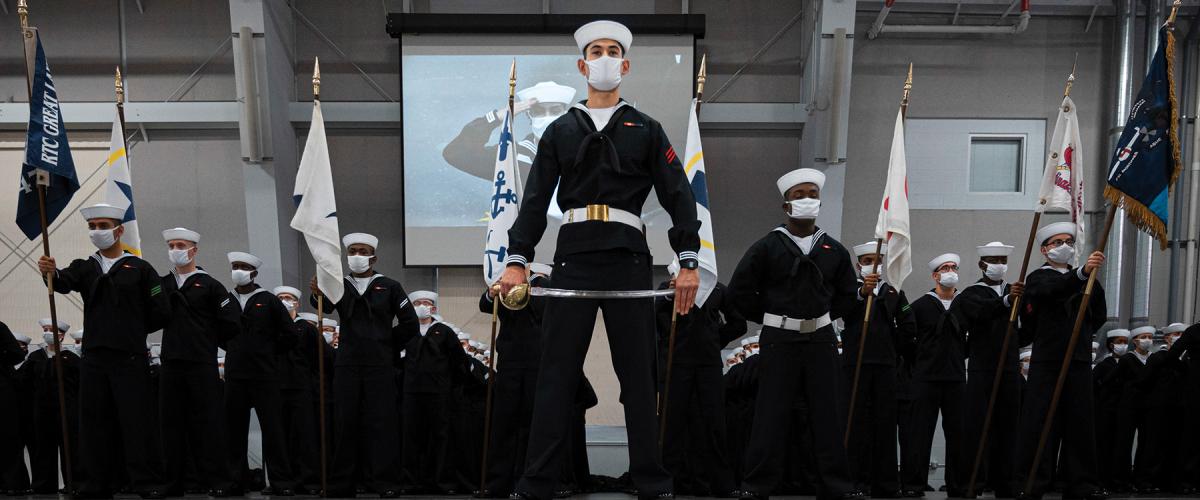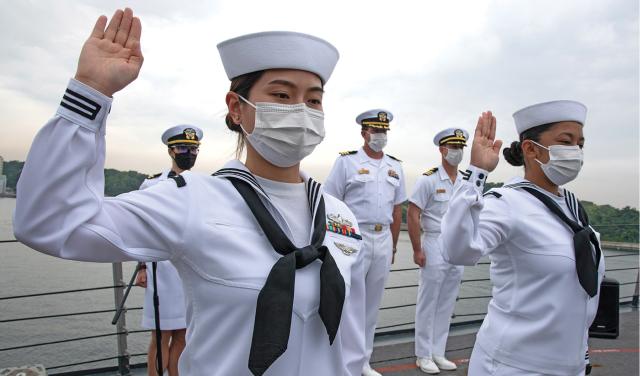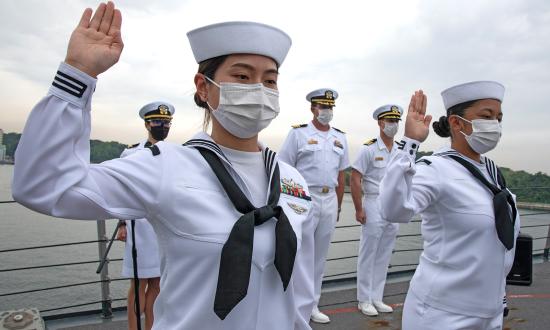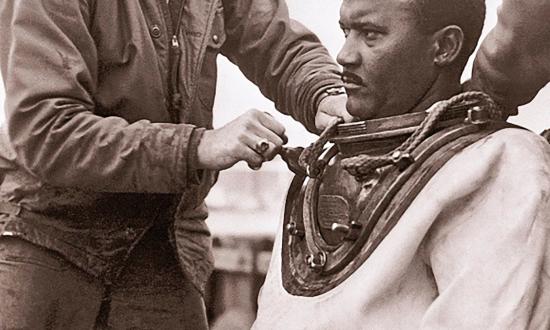From the very first days of enlistment, sailors are told that the Navy values diversity and inclusion and that racism is not tolerated. Between my civilian, academic, and military experiences, the Navy is the most diverse workplace I have ever experienced. However, racism and intolerance are still prevalent. Events—from the El Paso shootings to the Capitol riots—have thrust racism and political extremism into the spotlight. Accordingly, the Navy needs to do more to support and protect immigrants and people of color who volunteer to serve in its ranks.
The United States is defined by a commitment to freedom and equality, creating an attractive place for immigrants who seek political rights and economic opportunity. While there are many painful examples of the nation failing to live up to that promise, I believe—as Martin Luther King Jr. did—that the arc of U.S. history bends toward justice and upholding those values. I am proud to wear the representation of those values on the shoulder of my uniform.
Thousands of immigrants sign up to serve in the U.S. military each year, with an estimated 511,000 foreign-born veterans living in the United States.1 Beyond the obvious advantages, such as language skills and life experiences, immigrants bring a cultural richness to a military that is often the primary representation of the United States to nations around the world.
Having a diverse corps of culturally competent service members can greatly enhance the image of the United States. Our government should be doing everything in its power to support and encourage sailors from immigrant communities, all of whom have shown a willingness and desire to serve their chosen home.
I have the privilege of being born in the United States, but I grew up abroad, and I am grateful for the opportunity to serve in the Navy. I am also proud to serve alongside service members from all over the country and the world. Our naval heritage is full of sailors who persisted in the face of racism, from Master Chief Carl Brashear, who broke multiple barriers during his career as a diver, to the Golden 13, who became the Navy’s first Black officers.2 Many sailors owe an immense debt of gratitude to the bravery of those who were willing to resist injustice. The values of justice, freedom, and equality need to be reinforced at every opportunity, with the same urgency as the Navy core values.
Extremism inside the military and veteran communities has grown so severe that Defense Secretary Lloyd Austin ordered a standdown to address it. The Capitol riots on 6 January 2021 included many veterans and a few active-duty military members with extremist beliefs. Nearly 1 in 5 defendants charged in the riots were found to have served in the military.3
Racism and extremism among service members and veterans is not a new issue. There have been decades of headlines describing violent terrorist attacks, such as the Oklahoma City bombing, the Fort Hood massacre, and others. While the Navy should encourage sailors to be civically engaged and participate in the political process, it is important to train sailors to identify red flags in political movements. It also is important to aggressively prosecute extremists who make their fellow service members feel unsafe.
Supporting All Sailors
I have had the privilege of serving alongside sailors who sought to become citizens through military service. The federal government currently allows immigrants to apply for naturalization after one year of military service.4 Unfortunately, not every service member is made aware of this right, and there have been cases of veterans being deported even after honorably completing military service.5 This situation is unacceptable, and every veteran who has gained naturalization status through service deserves the same rights and representation any U.S. citizen would have.
It also is important to acknowledge the difficulties many immigrants face in the military. Immigrant sailors perform the same duties and experience the same hardships as their peers but in addition might be working in their second or third language while providing for families thousands of miles away in different countries. Helping facilitate connections and family support could prove immensely beneficial for financial and mental health in the Navy’s immigrant community. While no one in the Navy should be provided special treatment, it is important to recognize extra difficulties service members may face and provide reasonable accommodations to help them perform their duties.
With our national reckoning on race and injustice, it is important to support our own military community. Service members have a long history of agitating for civil rights, serving in the vanguard of democracy both on the battlefield and on city streets. Medgar Evers fought for freedom at every turn, both as a sergeant in the U.S. Army and as an activist in the civil rights movement. He survived German bullets on the shores of Normandy only to be shot in the driveway of his home in Jackson, Mississippi.6 He was emblematic of the Black service members who led in the Double V campaign, proudly battling Nazis abroad and racism at home.7
If the United States is going to be the champion of liberty and defend our democratic allies from aggression by Russia and China, it must be willing to confront its own shortcomings. As the most trusted, prominent, and potent national institution, the military must lead the way on antiracism. The Navy must perform all needed steps to live up to the sailor’s creed with a firm commitment to “excellence and the fair treatment of all.”
1. Anrew Moriarty, “Immigrants in the Military: 5 Things to Know,” fwd.us, 6 January 2020.
2. Kaylah Jackson, “Master Chief Carl Brashear, the U.S. Navy’s First Black Master Diver,” Audacy.com, 5 February 2020; Dan Goldberg, “The Forgotten Story of How 13 Black Men Broke the Navy’s Toughest Color Barrier,” Politico, 25 May 2020.
3. Tom Dreisbach and Meg Anderson, “Nearly 1 In 5 Defendants In Capitol Riot Cases Served in the Military,” NPR, 21 January 2021.
4. U.S. Citizenship and Immigration Services, “Naturalization through Military Service,” 23 February 2021.
5. Maria Ines Zamudio, “Deported U.S. Veterans Feel Abandoned by the Country They Defended,” NPR, 21 June 2019.
6. NAAAP, “NAACP History: Medgar Evers,” 13 July 2018.
7. Matthew Delmont, “Why African-American Soldiers Saw World War II as a Two-Front Battle,” Smithsonian Magazine, 24 August 2017.







